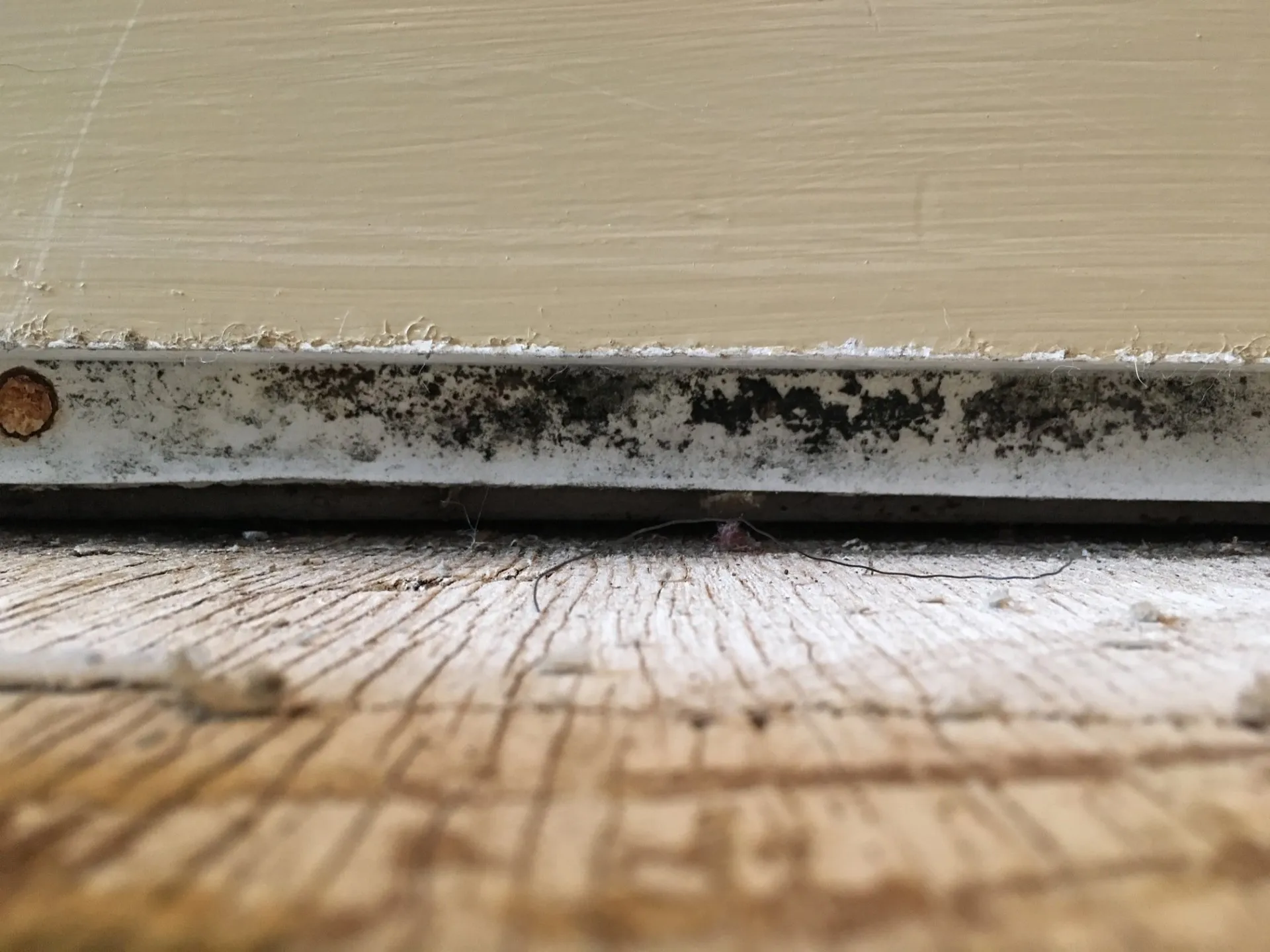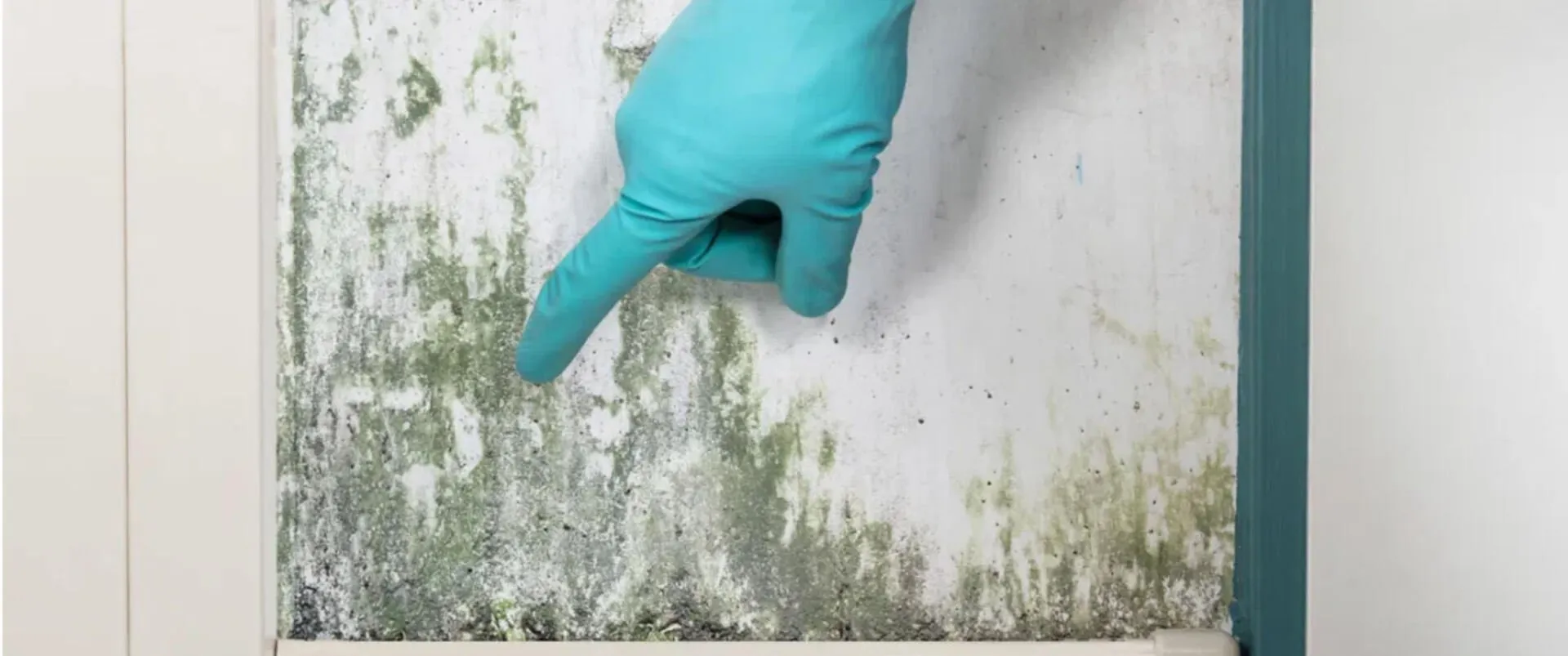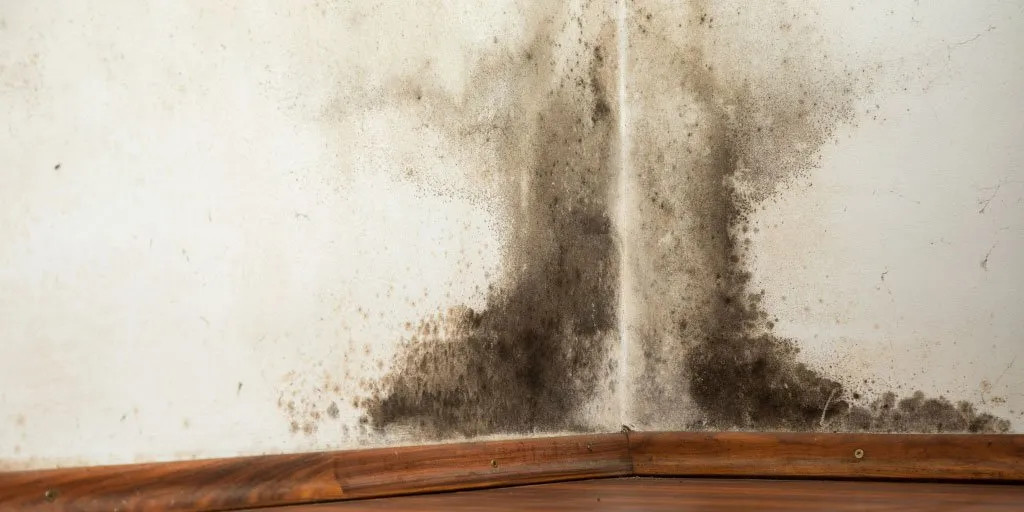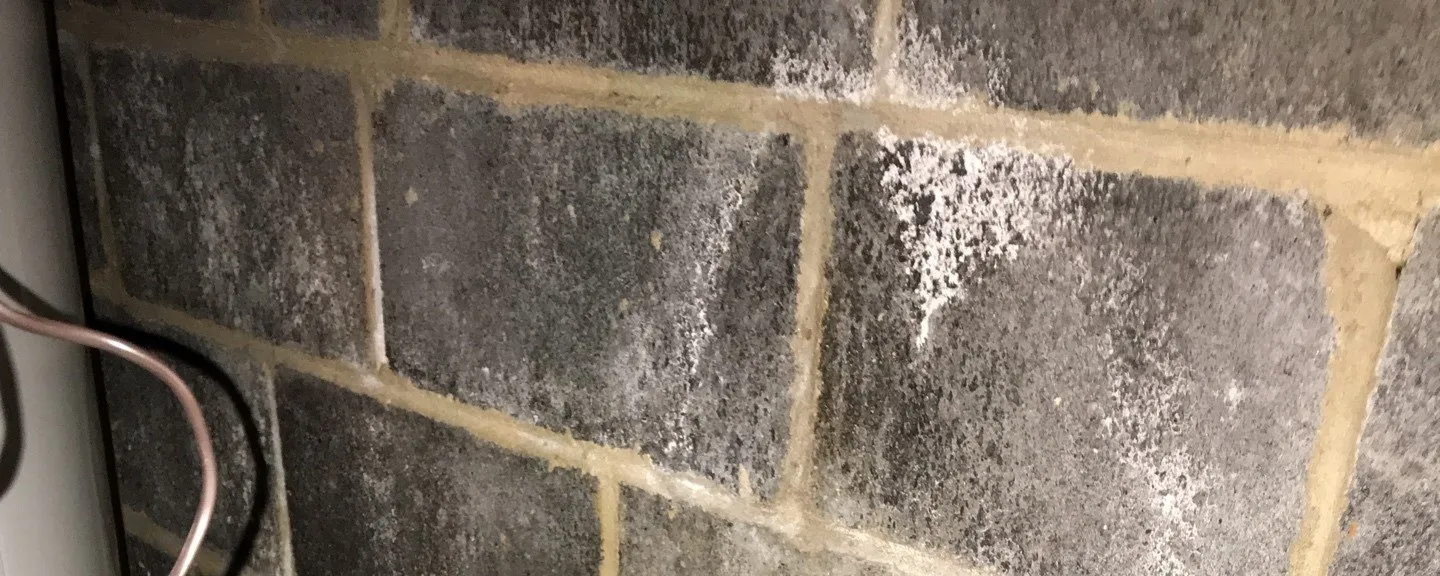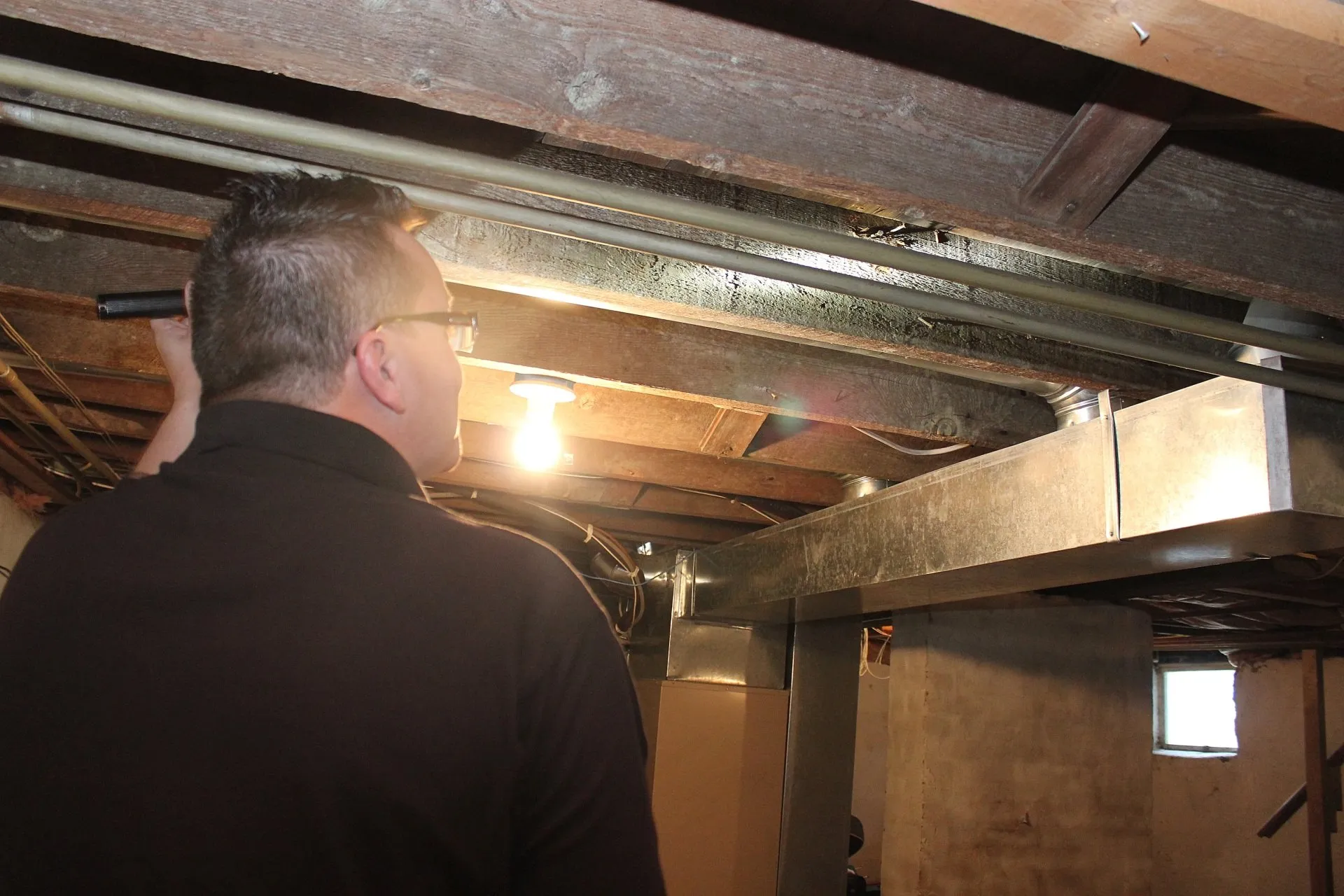
While some mold situations will be very visibly apparent, that is not always the case. Mold spores are microscopic and can contaminated virtually any surface, especially hidden surfaces like within your wall voids, above drop ceilings tiles, under flooring, behind wall finishes, behind furniture and other hard-to-reach areas. When spores are introduced to moisture, the spores will germinate, root into porous building materials and spread without notice. Since mold and moisture can spread to all kinds of hard-to-reach areas, Kansas property owners often can’t properly diagnose a mold problem on their own. If you suspect a possible mold problem in a property, a local mold inspection professional in Kansas will be able to help determine the full extent of the issue by performing a comprehensive mold inspection with mold testing.
The inspection process is designed to gather enough information to determine if there is a mold problem, find the moisture source, identify the full extent of the issue, and figure out a proper plan for removal. Professional mold inspections often include a visual assessment with moisture mapping, thermal imaging and mold testing. Mold testing is a combination of surface sampling and/or indoor air quality sampling. Sampling for mold should be conducted by professionals who have specific experience in mold sampling protocols, sampling methods and interpreting results.
What is Air Quality Testing? How to Test the Air for Mold?
The most common types of mold tests are surface samples and air samples. Surface sampling is a little more straightforward. It is the collection of a sample from a surface with visible concerns via tape lift or swab. Testing the air for mold is often more difficult to conceptualize. What exactly is air quality testing? How do you test the air? Specifically, air quality testing for mold is the collection of air samples for laboratory analysis to determine whether or not the indoor air has been compromised by an excessive quantity of mold. To collect air samples, a trained mold inspector will set up a calibrated bio-pump that will pull a specified volume of air over a sterile collection medium within a cassette. The sample is later analyzed by a 3rd-party, accredited laboratory.
Should I Get The Air In My Home or Business Tested For Mold?
While air testing is very valuable, not all situations are the same and not all situations will require testing. The EPA’s stance on mold testing is that, “In most case, if mold is present and visible, sampling for mold is unnecessary. If the extent of the problem has been determined and the underlying moisture problem is resolved, the goal will be to remediate.” In other words, if the mold is visibly apparent, the industry protocol is removal followed by moisture control. On the other hand, air testing can provide valuable information regarding hidden mold, airborne mold and more. Airborne mold spores are microscopic and can only be confirmed by air sampling. Air sampling can provide important information regarding the indoor air that cannot be determined via visual assessment alone. There could be elevated airborne mold, toxic mold or black mold that is just not visibly apparent.
While there is a lot of focus on professional mold testing in Kansas and a lot of literature on the importance of air quality testing, it is also important to note the valuable information that an inspector gathers during the rest of the inspection. In addition to testing, a comprehensive mold inspection also includes a comprehensive visual assessment for visual indicator of fungal growth and signs of moisture issues. We will conduct moisture mapping with moisture meters, thermal imaging cameras and hygrometers to figure out what could be causing a mold problem. All this information provides context for discovery of mold by revealing what caused the mold and how to prevent its regrowth.
Why Should I get My Property Tested for Mold?
Not sure if you have mold? Think you should get your home or business tested for mold? Here are some of the most common situation in which mold testing would be beneficial.
- Odors: Do you smell something, but don’t see anything? The source of a musty odor can be difficult to track down without a mold inspection. When mold spores aerosolize, odors can permeate different areas of the structure.
- Moisture: If there has been a history of moisture problems in the structure – roof leaks, basement floods, plumbing leaks, broken pipes, high humidity, HVAC leaks, poor attic ventilation, etc., there could be an underlying mold problem beyond was is visibly apparent.
- Health Concerns: If anyone in the house or building is experiencing unexplained, allergy-like symptoms, especially when inside the structure or after spending an extended period time in the structure. Mold testing can determine if the air has been compromised by mold.
- Sick Building Syndrome (SBS): Anyone complaining of the following symptoms while in the house or building, but symptoms disappear after leaving house of building: headache, eye, nose or throat irritation, dry cough, dry or itchy skin, dizziness and nausea, difficulty concentrating, fatigue, sensitivity to odors, rash.
- Building Related Illness (BRI): Symptoms that may continue upon leaving the house or building including: cough, chest tightness, fever, chills, and muscle aches.
- Clearance Testing: Following a mold remediation, we recommend to have the space post-tested to ensure that the previous mold issues have been resolved and mold counts have returned to normal.
- 3rd Party Requirements: To provide scientific evidence and report to satisify 3rd party requirements (i.e.: real estate transactions, tenant/landlord disputes, property financing requirements, etc.)
- Hidden Mold: If there is a suspicion of hidden mold that might be developing behind walls or under building materials. A mold inspection with testing can also determine if there is an elevated mold spore count in the air.
- Peace of Mind: Maybe you have a general concern throughout the structure and just want it checked just in case. Or perhaps you are buying a home and want to make sure you are not buying a moldy house.
How to Prepare for Indoor Air Quality Testing?
If you are scheduling air quality testing for mold in your home or business, you should prepare the area before the inspection begins. Air quality testing is easy to conduct, but the accuracy of the results partly depends on how well you’ve prepared the area. The first step is to look for the visible mold. If mold is visible, you may not need to test the air quality. Mold is usually visible in damp areas, such as crawl spaces, basements, bathrooms, and kitchens. If you find mold, you can prepare directly for mold removal and remediation.
Sometimes, mold is not visible, but you may be experiencing health symptoms that indicate the presence of the mold, such as allergic reactions or skin irritations. If that happens, you may need to test your indoor air quality to confirm mold presence. Here are some tips to prepare:
- Close any doors, windows, and vents for at least 24 hours before sampling the air
- Don’t spray air fresheners or use dehumidifiers before testing
- Schedule a professional inspection and follow the guidelines recommended by professionals
- If you are present while the testing is taking place, make sure to wear safety gloves and a filtration mask
Can I Test Myself for Mold Exposure?
Tests cannot determine when or where you were exposed to mold. However, you can be tested for allergic reactions to mold. Blood tests can determine the presence of any antibodies, and skin tests can predict allergic reactions. The ideal way to resolve health problems caused by mold is to eliminate mold from your living area, which requires professional mold testing and removal.
Local Mold Inspection Services in Kansas
Lamunyon’s local mold inspectors are professionally trained and industry certified to perform comprehensive mold inspection in residential and commercial buildings throughout Kansas. Our inspections include air quality testing and surface sampling to provide scientific analysis of the indoor fungal ecology. The Lamunyon Team services all of Topeka, Manhattan, Salina, McPherson and the surround Kansas areas. Call our local office today to learn more about our services near you.

